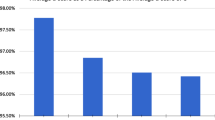Abstract
In this paper it is argued that Hintikka's game theoreticalsemantics for Independence Friendly logic does not formalize theintuitions about independent choices; it rather is aformalization of imperfect information. Furthermore it is shownthat the logic has several remarkable properties (e.g.,renaming of bound variables is not allowed). An alternativesemantics is proposed which formalizes intuitions aboutindependence.
Similar content being viewed by others
References
Caicedo, X. and Krynicki, M., 1999, “Quantifiers for reasoning with imperfect information and Σ1 1 logic,” pp. 17–31 in Advances in Contemporary Logic and Computer Science. Proceedings 11th Brazilian Conference on Mathematical Logic 1996, W.A. Carnielli and I.M. d'Ottaviano, eds., Contemporary Mathematics, Vol. 235, Providence, RI: Americal Mathematical Society.
Cook, R. and Shapiro, S., 1998, “Hintikka's revolution ‘The Principles of Mathematics Revisited’,” British Journal for the Philosophy of Science 49, 309–316.
de Swart, H., Verhoeff, T., and Brands, R., 1997, “Hintikka's ,” Logique et Analyse 159, 281–289.
Halpern, J., 1997, “On ambiguities in the interpretation of game trees,” Games and Economics Behavior 20, 66–96.
Hintikka, J., 1974, “Quantifiers vs. quantification theory,” Linguistic Inquiry 5, 153–177.
Hintikka, J., 1996, The Principles of Mathematics Revisited, Cambridge: Cambridge University Press.
Hintikka, J. and Sandu, G., 1997, “Game-theoretical semantics,” pp. 361–340 in Handbook of Logic and Language, J. van Benthem and A. ter Meulen, eds., Amsterdam: Elsevier and Cambridge, MA: The MIT Press.
Hodges, W., 1997a, “Compositional semantics for a language of imperfect information,” Journal of the IGPL 5, 539–563.
Hodges, W., 1997b, “Some strange quantifiers,” pp. 51–65 in Structures in Logic and Computer Science, J. Mycielski et al., eds., Lecture Notes in Computer Science, Vol. 1261, Berlin: Springer-Verlag.
Janssen, T., 1997, “A compositional semantics for the game-theoretical interpretation of logic,” pp. 181–185 in Proceedings of the Eleventh Amsterdam Colloquium, P. Dekker, M. Stokhof, and Y. Venema, eds., ILLC/Department of Philosophy, University of Amsterdam.
Janssen, T., 1999, “IF logic and informational independence,” pp. 139–144 in Proceedings of the Twelfth Amsterdam Colloquium, P. Dekker, ed., ILLC/Department of Philosophy, University of Amsterdam. INDEPENDENT CHOICES AND THE INTERPRETATION OF IF LOGIC 387
Pietarinen, A., 2001, “Varieties of Ifing,” pp. 25–32 in Proceedings of the ESSLLI'01 Workshop on Logic and Games, G. Sandu and M. Pauly, eds., Department of Philosophy, University of Helsinki.
Pietarinen, A., 2002, “Games logic plays. Informational independence in game theoretical semantics,” Ph.D. Thesis, School of Cognitive and Computing Sciences, University of Sussex (preliminary version).
Sandu, G., 1993, “On the logic of informational independence and its applications,” Journal of Philosophical Logic 22, 26–60.
Author information
Authors and Affiliations
Rights and permissions
About this article
Cite this article
Janssen, T.M. Independent Choices and the Interpretation of IF Logic. Journal of Logic, Language and Information 11, 367–387 (2002). https://doi.org/10.1023/A:1015542413718
Issue Date:
DOI: https://doi.org/10.1023/A:1015542413718




